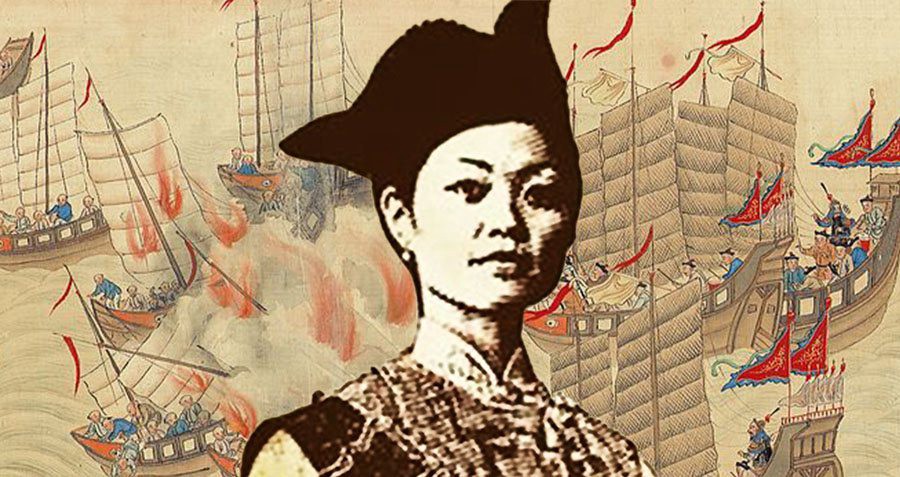Last updated on January 26th, 2023 at 01:18 am
Even though Ching Shih was only active as a pirate for about nine years, she certainly earned the “World’s Most Successful Pirate.”
Also known as Zheng Yi Sao and Shi Yang, she was born in 1775 to a family of humble means. When she turned 26, she married a pirate named Zheng Yi. After he passed away in 1807, she and her adopted son took control of the family’s pirate confederation.
It was estimated that her fleet consisted of between 400 to 1,000 vessels and up to 80,000 pirates. Ching Shih would enter into several conflicts with the world’s powers at the time, including the East India Company and Qing China.
In 1810, she and her family negotiated a surrender with Qing authorities, allowing her to retain most of her fleet and avoid charges.

How a Woman Became the World’s Most Successful Pirate
The early years in the life of Ching Shih are unknown. It is thought that she was part of the Tankas, or boat people, who lived in Southern China.
She rose to power after marrying Zheng Yi, a well-known pirate in his own right, in 1801. The family had connections to piracy that dated to the Ming Dynasty. Some stories suggest that Ching Shih demanded equal control of the family fleet as a condition of getting married.
Her adopted son, Zhang Bao, had been abducted by Zheng Yi in 1798 when he was 15 years old and put into the family business.
Zheng Yi’s cousin was captured and killed in 1802, allowing him to take control of the remaining fleet. Ching Shih’s family helped broker peace as the pirates started fighting amongst themselves.
By uniting the pirates into a confederation agreement in 1805, six fleets were created and identified by flag colors. Zheng Yi commanded the largest of them.
In 1807, Zheng Yi fell overboard during a storm and died. Ching Shih moved quickly to take over the family operations, balancing the different factions within the confederation. Zhang Bao took over his “father’s” fleet while she became the informal leader of everyone.
Her Codes of Conduct Allowed the Confederation to Grow
Ching Shih had several codes of conduct that were considered enforceable laws within the context of the pirate confederation. Although these rules created more bureaucracy, they would also be the foundation that brought everyone together to work with each other.
Some of the most notable codes were that no one could retain goods before inspection, currency was to be given to the squadron leader, and anyone caught giving commands arbitrarily or disobeying a direct order from a superior had committed a capital offense.
Two Events in 1808 Cemented Her Power as a Pirate
The year after Ching Shih took power, her confederation became quite active. This period of activity started when they lured the brigade-general of Humen into an ambush and destroyed his fleet of 35 vessels. A month later, a lieutenant colonel suffered a similar fate, reducing the Chinese provincial fleet by at least 50%.
Those activities allowed the confederation to have access to the Pearl River.
In 1809, Ching Shih ordered a significant raid that involved multiple fleets. The battles would last for six weeks, destroying numerous settlements and villages. By September, she took command of 500 vessels and ordered the town of Shating to be raided. A month later, the provincial fleet attempted to stop the confederation, but they were again defeated.
Stepping down as a pirate
In November and December of 1809, the tides turned against Ching Shih. One of her fleets refused to reinforce her efforts during a battle in Tung Chung Bay, then had an open conflict with her. The leader of that fleet, Guo Podai, surrendered and was given rank in the provincial navy.
The British and Portuguese governments joined with the Chinese efforts to stop the confederation’s activities. This activity, combined with local policies involving embargoes removing supply line access, eventually led to Ching Shih’s surrender on April 20, 1810.
As part of the agreement, she was allowed to retain her status, the crews were pardoned, and Zhang Bao was given the rank of lieutenant and allowed to maintain a private fleet.
Although Ching Shih’s pirate activities were only for a brief time, they allowed her to live out her remaining years in comfort and luxury. Her legacy is reflected in Mistress Ching’s character in The Pirates of the Caribbean franchise.
Sources
https://www.worldcat.org/title/bandits-at-sea-a-pirates-reader/oclc/1200899862&referer=brief_results
https://www.jstor.org/stable/41298765
https://www.jstor.org/stable/24573942
http://nansha.schina.ust.hk/Article_DB/sites/default/files/pubs/news-046.02.pdf

